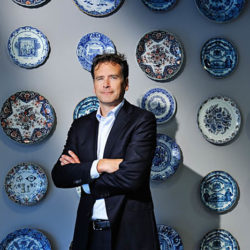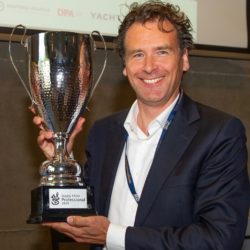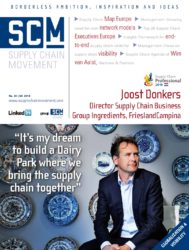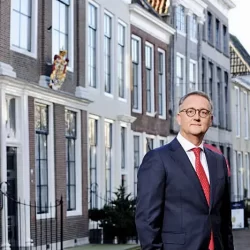Joost Donkers, FrieslandCampina: “My dream is to build a Dairy Park to bring the supply chain together”

When he was younger he wanted to become a vet, but today Joost Donkers feels right at home as Director Supply Chain Business Group Ingredients at FrieslandCampina – the role in which he was also voted Supply Chain Professional 2018. His motto: try to simplify things. “In that context, we’ve thought up ‘four times zero’: zero accidents, zero quality issues, zero missed orders and zero losses. It’s a nice slogan that’s easy for employees to remember.”
By Caroline Linssen
FrieslandCampina processes milk into milk proteins, whey proteins, fats and lactose. The Business Group Ingredients sells these products to the pharmaceutical industry and food manufacturers who use them to make things like specialized nutritional products and supplements for humans and animals. The raw materials are used to produce baby formula, including under the company’s own label: Friso. They are also found in consumer products such as coffee creamers, bakery products and dairy drinks.
The sales offices, research departments and manufacturing facilities (in the Netherlands, Germany, the USA, Brazil, Egypt, New Zealand and Asia) are grouped together in clusters: single ingredients, baby food, encapsulated ingredients and a joint venture with DFE Pharma. The four manufacturing directors report directly to Joost Donkers. Besides them, his team comprises the director of sales and operations planning, distribution and outsourcing, and the performance excellence director. Donkers: “We’ve also grouped together other people who have similar knowledge and expertise, such as HR, finance, purchasing and quality assurance. They report to their own section head, but they also have a reporting line to me. That greatly improves information sharing. I’m not someone who manages at detail level, and I believe strongly in a model based on indirect reports.”
Each of the companies in your business group used to have its own supply chain. Why has that changed?
“We discovered that we weren’t the best-in-class. We closed that ten-to-fifteen-year gap in the space of four years by bringing together people with the right passion and a shared goal. My award was recognition of that, so we’ve shared it among all the 120 managers in my supply chain. It was a challenge, because although our factories are spread around the world they are closely linked by the product flows. If something goes wrong in one factory, it affects a lot of others too. Our network is also pretty full, so we don’t have much room to divert production. Plus we’re in a growth market with annual investment of more than €150 million. It was a huge help that the then-boss was a strong advocate of business-group-oriented supply chains. The manufacturing directors initially found it hard to adapt to the new way of working, but they’ve now got used to managing a functional rather than hierarchical organization.
For me, it means that I’m now on a journey with a single team. I’ve invested a lot of time in the connections between my people. That has meant speaking regularly from the heart and the gut, then you automatically form a bond over time. Every team meeting starts with a check-in: tell us how you are. Most of the time it’s about personal issues; people solve the problems together. So the group of individuals has become a strong community. When a new member joined the team he took a while to adjust but, thanks to my very open management approach and not forcing anything, he is now just as involved as the rest.” … … …
Want to read more?
Subscribe on iPad or Android tablet to read the full version >>
or
Subscribe on print to receive the next issue >>
This article was first published in Supply Chain Movement 31 | Q4 – 2018










